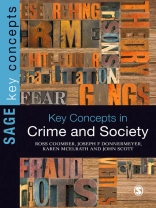’A crucial text for whetting the academic appetite of those studying criminology at university. The comprehensive engagement with key crime and deviance debates and issues make this a perfect springboard for launching into the complex, diverse and exciting realm of researching criminology.’
– Dr Ruth Penfold-Mounce, University of York
'Essential reading for those new to the discipline and an invaluable reference point for those well versed in criminology and the sociology of crime and deviance.’
– Dr Mark Monaghan, University of Leeds
Key Concepts in Crime and Society offers an authoritative introduction to key issues in the area of crime as it connects to society. By providing critical insight into the key issues within each concept as well as highlighted cross-references to other key concepts, students will be helped to grasp a clear understanding of each of the topics covered and how they relate to broader areas of crime and criminality. The book is divided into three parts:
- Understanding Crime and Criminality: introduces topics such as the social construction of crime and deviance, social control, the fear of crime, poverty and exclusion, white collar crime, victims of crime, race/gender and crime.
- Types of Crime and Criminality: explores examples including human trafficking, sex work, drug crime, environmental crime, cyber crime, war crime, terrorism, and interpersonal violence.
- Responses to Crime: looks at areas such as crime and the media, policing, moral panics, deterrence, prisons and rehabilitation.
The book provides an up-to-date, critical understanding on a wide range of crime related topics covering the major concepts students are likely to encounter within the fields of sociology, criminology and across the social sciences.
Spis treści
SECTION ONE: UNDERSTANDING CRIME AND CRIMINALITY
Crime (definition of)
Deviance (definition of)
Crime in pre-industrial society; crime in modern societies; crime in post-modern society
The criminal justice system
Social construction of crime and deviance
Crime and theory
Social Control, Governance and Governmentality
Researching crime
Crime statistics
Prevalence, incidence and incident of crime
Risk from crime
Risk of becoming criminally involved: why do people commit crime
Fear and the fear of crime
Poverty and exclusion
Victims of crime
Normalisation
Gender and crime
Youth and crime
Race/ethnicity and crime
White collar/middle class and corporate class crime
SECTION TWO: TYPES OF CRIME AND CRIMINALITY
Human trafficking/slavery
Sex work
Victimless crime
Drug related crime and violence
Gangs
Environmental crime and green criminology
Rural crime
Internet/cyber crime
State Crime
War Crime
Terrorism
Violence/Interpersonal Violence
SECTION THREE: RESPONSES TO CRIME
Crime and the Media
Moral Panics
Police and Policing
Deterrence and Prevention
Punishment
Prisons
Rehabilitation
Alternatives to Imprisonment
O autorze
John Scott, Ph D, is a Professor in the School of Behavioural, Cognitive and Social Science at the University of New England. His primary research interests are in the fields of sociology (sociology of gender, health and sexuality) and criminology (sociology of deviance and social control). A common theme in his research has been a concern with marginalized social populations and the development of critical and interpretive perspectives to understand the experiences of and social reactions to such populations. He specializes in qualitative methodologies, especially interviews and focus groups.












